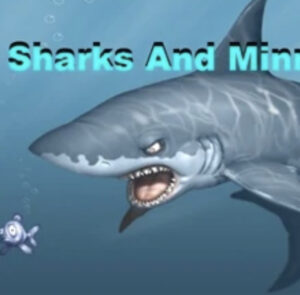 Last week we talked about the law of the playground (and the jungle), that in spite of well meaning attempts to extinguish the phenomenon of “sharks” picking on the “minnows,” the law of the playground persists (Sharks & Minnows (Part I).
Last week we talked about the law of the playground (and the jungle), that in spite of well meaning attempts to extinguish the phenomenon of “sharks” picking on the “minnows,” the law of the playground persists (Sharks & Minnows (Part I).
Picking up on the smallest drop of blood, the sharks jump in. It really doesn’t take much to get things going in a not so great direction.
It may not be overt or aggressive, but the minnows feel it.
“She can’t even read – she’s so stupid,” Claire overheard from one of the sharky kids snickering to a few other sharky types in the lunchroom as she walked past them.
Sometimes the minnows unknowingly hand it over to them, by acting too silly or too over the top, like young Nicholas who is always making “knock knock” jokes that no one wants to hear. (I say these kids can be “too too.”)
So, if it’s an immutable law, what’s to be done (keeping in mind that there are no easy answers to any of it)?
Here are a few points:
- Watch overuse of the word “bullying:” As noted on stopbullying.gov. Bullying represents unwanted, aggressive behavior among school aged children that involves a real or perceived power imbalance. The behavior is repeated, or has the potential to be repeated, over time.
Others may disagree, but I don’t think Claire’s situation above would qualify as bullying. If that type of interaction is repeated over time, that’s a different story and the school should be notified to address the issue with their HIB policy.
- Sensitizing the Minnows: This is much easier said than done. A young man I work with mentioned above, Nicholas, is a great kid, but he can set himself up unwittingly to be shark chum. I try (the best I can) to help him to turn his dial down a little in group situations Not blurting out the first thing that comes to your mind, being mindful of side behaviors like cracking knuckles, making jokes or tapping too much are small examples. There are many other behaviors like these that get the sharks going. Having a child like Nicholas get feedback in therapy about their social behavior can be helpful.
- Sensitizing the Sharks: When I worked in schools, I’d like to believe I could sensitize the sharks to some extent, not by “getting in their grill,” but by talking to them in plain, direct language. “Listen, man, I saw you giving Nicholas a hard time the other day in the playground. I know he gets on your nerves, but it’s really starting to bother him. I’d appreciate it if you backed it down,” is the type of thing I would say to a shark. Most of the time, talking to the shark directly worked more often than not.
Adult involvement is key with any intervention.
Without adult involvement, neither the sharks nor the minnows will alter their behavior, or to borrow another metaphor – “Leopards don’t change their spots.”
Feel free to make comment below. To receive future blog posts, register your email: https://shutdownlearner.com.
To Contact Dr. Richard Selznick for advice, consultation or other information, email – rselznick615@gmail.com.
 Copyright, Richard Selznick, Ph.D. 2023, www.shutdownlearner.com.
Copyright, Richard Selznick, Ph.D. 2023, www.shutdownlearner.com.

I do anti-bullying work for a living. I agree with your definition of bullying, and that the label is overused, especially by parents. However, while we certainly want to teach the “minnows“ resilience, it is just as important to teach the “sharks” empathy. And one of the most important mitigating factors in the situation is the actions of the bystanders. Teaching bystanders to become allies is crucial in interrupting this dynamic.
Thanks for your comment, Lisa. Agree entirely.